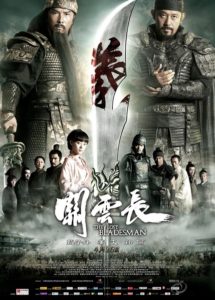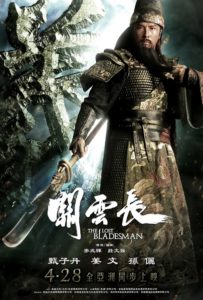The Lost Bladesman
关云长
Hong Kong/China, 2011, colour, 2.35:1, 108 mins.
Directors: Mai Zhaohui 麦兆辉 [Alan Mak], Zhuang Wenqiang 庄文强 [Felix Chong].
Rating: 6/10.
Serviceable costume action-drama is just about held together by its two leads’ starpower.
China, late Eastern Han dynasty, AD 200. After briefly stabilising the war-torn Eastern Han dynasty, the emperor’s right-hand man Cao Cao (Jiang Wen), a general, is faced with an attack by warlord Yuan Shao that climaxes in a battle at Baima. Cao Cao asks one of his earlier prisoners, the distinguished general Guan Yu, aka Guan Yunchang (Zhen Zidan), to kill Yuan Shao’s chief warrior Yan Liang (Qian Xiaohao). For the sake of peace, Guan Yu agrees, and is later decorated by Cao Cao. Though Guan Yu is a sworn brother of Cao Cao’s enemy, rival warlord Liu Bei (Fang Zhongxin), Cao Cao treats him with respect and tries to persuade him – by fair means and foul – to stay and rebuild the Han dynasty, currently led by a young, weak emperor (Wang Bojie). However,  Guan Yu says he must rejoin Liu Bei, and Cao Cao finally gives him permission to leave, even though Liu Bei has now joined forces with Yuan Shao. Guan Yu travels with Liu Bei’s future no. 3 wife, Qilan (Sun Li), with whom he is secretly in love, but finds that Cao Cao’s guarantee of safe passage means little. Along the way, he encounters various opposition at Dongling Pass, Luoyang, Sishui Pass, Xingyang and the Yellow River as he travels south to join Liu Bei and deliver Liu Bei’s new bride.
Guan Yu says he must rejoin Liu Bei, and Cao Cao finally gives him permission to leave, even though Liu Bei has now joined forces with Yuan Shao. Guan Yu travels with Liu Bei’s future no. 3 wife, Qilan (Sun Li), with whom he is secretly in love, but finds that Cao Cao’s guarantee of safe passage means little. Along the way, he encounters various opposition at Dongling Pass, Luoyang, Sishui Pass, Xingyang and the Yellow River as he travels south to join Liu Bei and deliver Liu Bei’s new bride.
REVIEW
Set eight years before the events in Red Cliff 赤壁 (2008-09) and featuring some of the same characters, The Lost Bladesman 关云长 is a serviceable costume action drama that just about gets by on the combined star power of Jiang Wen 姜文 and Zhen Zidan 甄子丹 [Donnie Yen] but doesn’t stand up to much serious examination on either historical or cinematic levels. Hong Kong writing-directing duo Mai Zhaohui 麦兆辉 [Alan Mak] and Zhuang Wenqiang 庄文强 [Felix Chong], whose most successful collaboration remains police surveillance drama Overheard 窃听风云 (2009), have tried for an ambitious combination of personal-ethical drama (individualism vs state discipline, heroism vs pragmatism) and straightforward costume action, with Zhen as a real-life Han dynasty general whose name is a byword even today for righteousness and the demands of sworn brotherhood, and Jiang as the equally legendary general Cao Cao for whom the greater good of peace and stability was always worth a political manoeuvre or three.
After a bumpy start that will be confusing for audiences not familiar with the era and its characters, the movie settles down for a while as the wary but respectful relationship between the two is laid out in several well-played sequences. At the 40-minute mark, when Zhen’s Guan Yu [aka Guan Yunchang, the film’s Chinese title] then sets out on his famous journey – “crossing five passes and slaying six generals” – it then switches into an episodic action movie with Zhen in okay but not especially memorable setpieces (choreographed by himself), before trying to reintegrate the personal-ethical strand in a dramatically shakey finale.
For Asian viewers, and especially Cantonese and southern Chinese for whom Guan Yu is an extremely well-known figure, the film will be a different experience. Revered to this day by everyone from triad groups and policemen to Daoists and Buddhists, with his exploits best known in their fictionalised form in the classic novel Romance of the Three Kingdoms 三国演义, the Guan Yu of Lost Bladesman is hardly the towering, fierce giant he’s immortalised as – and was so memorably played by Mijid Baasanjav 巴森扎布 in Red Cliff. Zhen looks suitably righteous in a scholarly moustache and beard but lacks a special physical presence in the fight scenes. Jiang, too, though always conveying a threat of violence behind his ever-present smile, is hardly an imposing Cao Cao in the footsteps of the masterly portrayal by Zhang Fengyi 张丰毅 in Red Cliff.
Dialogue swings between the elevated and colloquial, and Guan Yu’s suppressed love for his master’s future concubine – pertly played by Sun Li 孙俪 (Kungfu Cyborg: Metallic Attraction 机器侠 (2009) – tends, with its multiple flashbacks, to get in the way of the main drama rather than enhance Guan Yu’s character. Viewed as a Zhen Zidan vehicle, Lost Bladesman is more on the level of his 14 Blades 锦衣卫 (2010) than Ip Man 叶问 (2008), partly because Zhen is overshadowed by Jiang whenever the two are on screen. When Jiang is absent – as he is for most of the middle section – Zhen doesn’t have much of a character to play with.
Action is okay, with occasional visual flourishes by directors Mai and Zhuang, as well as by Hong Kong production designer Lei Chuxiong 雷楚雄. The biggest plus is the score by Li Yunwen 李允文 [Henry Lai] (14 Blades; Echoes of the Rainbow 岁月神偷, 2010), which adds an emotional element that’s missing in Mai and Zhuang’s shakily constructed script.
CREDITS
Presented by Star Union Skykee Film & Media Advertisement(CN), Shanghai Film Group (CN), Anhui Media Industry Group (CN). Produced by Pop Movies (HK).
Script: Mai Zhaohui [Alan Mak], Zhuang Wenqiang [Felix Chong]. Photography: Chen Zhiying. Editing: Kuang Zhiliang. Music: Li Yunwen [Henry Lai]. Production design: Lei Chuxiong. Art direction: Liu Jingping. Styling: Chen Gufang. Costume design: Zhang Ling. Sound: Lin Zhi’en, Zeng Jingxiang [Kinson Tsang]. Action: Zhen Zidan [Donnie Yen]. Stunts: Yan Hua. Special effects: Huo Jiantong. Visual effects: Lin Hongfeng (Free-D Workshop).
Cast: Zhen Zidan [Donnie Yen] (Guan Yu/Guan Yunchang, general), Jiang Wen (Cao Cao), Sun Li (Qilan), Fang Zhongxin [Alex Fong Chung-sun] (Liu Bei), Chen Hong (Lady Gan, Liu Bei’s no. 1 wife), Shao Bing (Zhang Liao, general), An Zhijie [Andy On] (Kong Xiu, general), Wang Xuebing (Wang Zhi), Wang Bojie (Han emperor), Dong Yong (Xun You, military advisor to Cao Cao), Li Zonghan (Qin Qi, general), Nie Yuan (Han Fu, Guan Yu’s former disciple), Qian Xiaohao (Yan Liang), Zhou Bo (Pu Jing, head monk), Yu Ailei (Bian Xi, general), Hei Zi (Meng Tan), Sang Ping (Xu Zhu), Zhao Ke (Lady Mi, Liu Bei’s no. 2 wife).
Premiere: Beijing Film Festival (Inauguration Ceremony), 20 Apr 2011.
Release: Hong Kong, 28 Apr 2011; China, 26 Apr 2011.
(Review originally published on Film Business Asia, 21 Apr 2011.)
